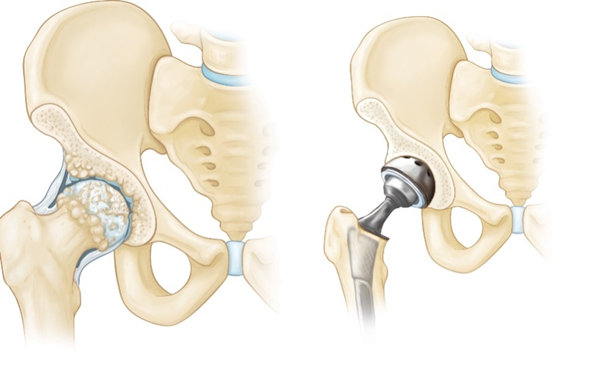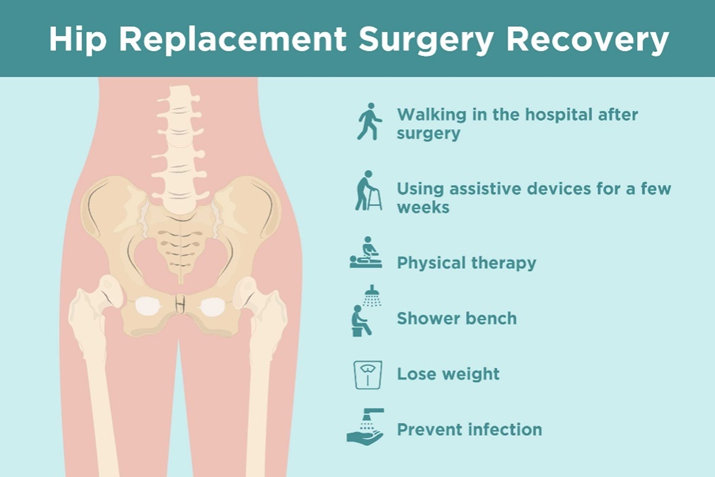Hip Replacement

Hip Replacement Doctor in Jaipur
Hip replacement in Jaipur is a relatively standard procedure where the surgeon replaces the damaged hip joint with an artificial joint. It is a safe and effective surgery that helps relieve pain and improve mobility.
Dr.Dilip Mehta is one of the best orthopedic doctor in Jaipur for total hip replacement. He has performed more than a thousand joint replacement surgeries in his career, spanning 15 plus years.
He has received extensive training and experience in hip and knee replacement surgery in the USA and Germany. Further, he has worked with some of the best international surgeons.
His mastery and impeccable track record in advanced orthopedic techniques make him one of the best hip replacement surgeon in Jaipur.
Hip Replacement Overview

mage Source: https://orthoinfo.aaos.org/en/treatment/total-joint-replacement/
Hip replacement, also referred to as total hip arthroplasty, is a surgical procedure performed to address hip pain, stiffness, or injury. The hip joint is a ball and socket joint where the ball is the femoral head, and the socket is the part of the pelvis bone called the acetabulum.
An artificial implant replaces the damaged or diseased ball and socket during the hip replacement procedure. This surgery is usually done when all other treatment options such as physical therapy, medications, and weight loss have failed to help relieve pain and improve function.
What are the causes that may lead to hip replacement?
You may have to undergo hip replacement if you have severe pain, damage, swelling, and stiffness in your hip joint because of:
- Osteoarthritis
- Rheumatoid arthritis
- An injury such as dislocation or fracture
- Avascular necrosis
- Tumor in the hip joint
- Childhood hip disease
Who may need a hip replacement?
Dr.Dilip Mehta, an experienced orthopedic doctor in Jaipur, only recommends hip replacement when other treatments are no longer effective, and your condition is affecting your quality of life.
- Severe pain that makes it difficult to rest, or sleep
- Trouble in walking, doing everyday tasks, or climbing stairs
- Stiffness in the hip
- Pain in the buttock
- Pain in the groin or hip
- Loss of motion
- Increase in pain due to weight on the leg
- Difficulty in dressing and putting on socks and shoes
Who are not eligible for hip replacement?
Not everyone can undergo hip replacement. Even though you are in pain and have trouble moving your hip, the doctor may not recommend hip replacement if you have:
- Active infection
- Irreversible muscle weakness
- Medical issues include recent heart attack, heart failure, unstable angina, anemia, etc.
- Immature skeleton
- Quadriplegia, paraplegia
What should you expect during orthopedic evaluation for hip replacement?
Before deciding whether total hip replacement is the right procedure for you or not, Dr.Dilip Mehta, an expert orthopedic surgeon in Jaipur, will ask about your medical history, general health, the extent of pain you experience, and how it affects your everyday life.
He will also a perform physical examination and check the hip alignment, strength, and mobility.
Furthermore, he may ask you to undergo an x-ray and MRI or CT scan if necessary.
Based on the result of your evaluation, he will decide if hip replacement-surgery in Jaipur is the best line of treatment for you.
Preparation before the surgery
Prior to hip replacement surgery, the surgeon will ask you do for a few tests such as:
- Blood tests
- Urinalysis
- EKG
- Chest x-ray
- Dental evaluation
Procedure for total hip replacement

Image Source: https://orthoinfo.aaos.org/en/treatment/total-hip-replacement/
Total hip replacement in Jaipur can be performed by minimally invasive surgery or traditional surgery, depending on your overall health and condition.
In minimally invasive surgery, one or two small incisions are made through which the surgeon performs the procedure, whereas a large single incision is made in traditional surgery.
Dr.Dilip Mehta is an expert in both surgical modalities and is considered one of the best hip replacement doctor in Jaipur.
Before beginning the hip replacement surgery, you will be given general or spinal anesthesia. Then Dr.Dilip Mehta will make the incision in the side or front of your hip and remove the diseased bone and cartilage.
He will then insert a prosthetic socket into your pelvic bone to replace the diseased socket and a prosthetic ball with a stem in the thighbone to replace the round ball on the femur. Finally, he will close the incision.
Most people nowadays prefer minimally invasive hip replacement surgery in Jaipur as it has many advantages, which include:
- Less blood loss
- Reduce the risk of muscle damage
- Quicker healing
- Less pain post-surgery
- Shorter stay in the hospital
- Minimum scarring
- Less limping
- Lesser chance of hip dislocation
After the procedure

Image Source: https://creakyjoints.org/treatment/hip-replacement-surgery-recovery-tips/
After your hip replacement in Jaipur, you will be in the hospital for 4-6 days. Physical therapy may begin on the same day or the next day of surgery, which you will have to continue for months after your procedure. After some days, you will be able to walk with the use of a walker or cane.
How carefully you follow the orthopedic surgeon's recommendations at home determines the effectiveness of your hip replacement operation.
You will need to see your surgeon for follow-up appointments to ensure that your hip is healing appropriately. If your recovery goes well, you may be able to resume some of your daily activities 6-12 weeks after surgery.
What is the cost of hip replacement in Jaipur?
The hip replacement cost in Jaipur is approximately Rs. 150000 to Rs. 300000. The variation in the price depends on the type of implant used, doctor’s experience, surgical approach, etc.
The charges for hip replacement at 3600 Knee Clinic,founded by Dr.Dilip Mehta, are economical and budget-friendly. He believes that comprehensive medical services should be within reach of everyone.
What is the long-term outlook after hip replacement?
The success rate of total hip arthroplasty is high, and there is a significant improvement in the patients’ quality of life in terms of pain and mobility.
With the advancement in the design and material of newer prostheses, the hip joint can last for many years, even several decades. However, due to obesity or high-impact activity, the hip replacement may deteriorate, and some people may need a second hip replacement.
Why choose Dr.Dilip Mehta for hip replacement surgery in Jaipur?
- Dr.Dilip Mehta is undoubtedly one of the best orthopedic surgeon in Jaipur, having extensive experience in joint replacement surgeries. He is known for his expertise and exceptional results.
- He has profound knowledge and skills in the latest minimally invasive surgeries, including arthroscopic surgeries that offer quicker healing and long-lasting results.
- Further, he has successfully handled thousands of complex surgeries with excellent outcomes. He ensures that his patients recover quickly and return to normal activities at the earliest.
